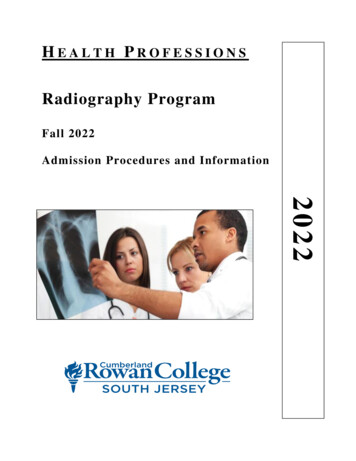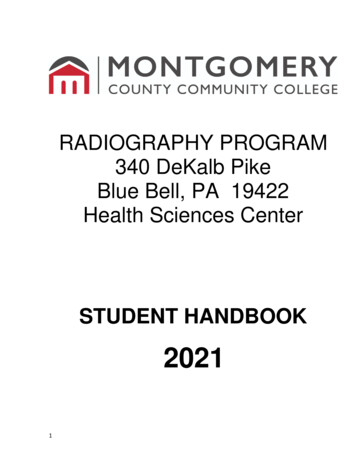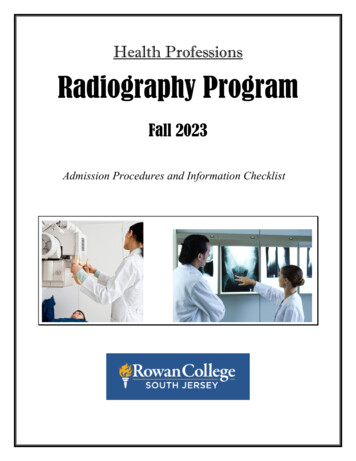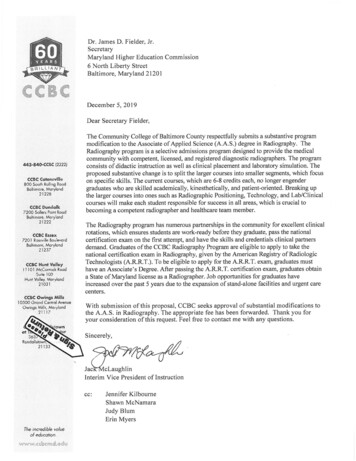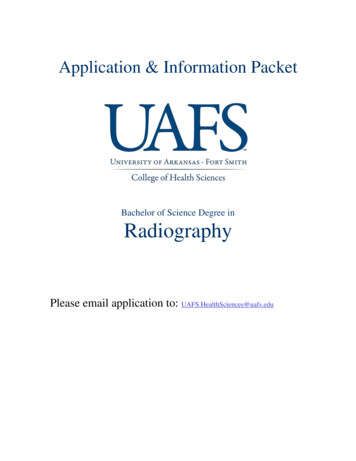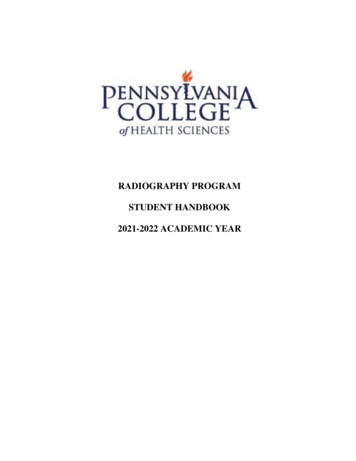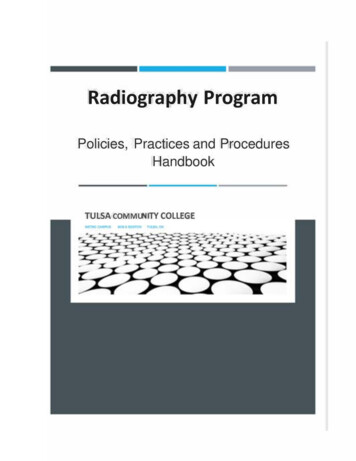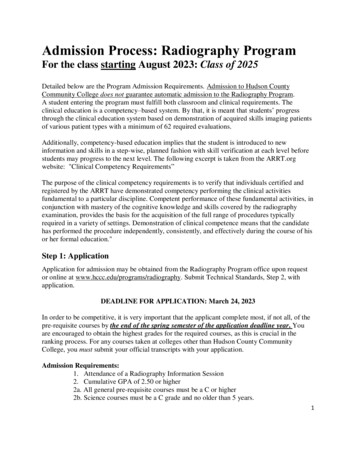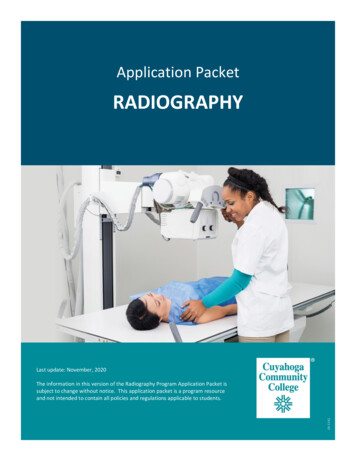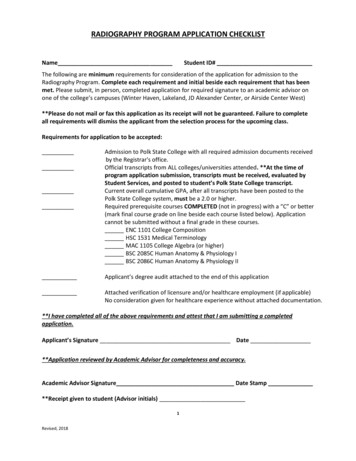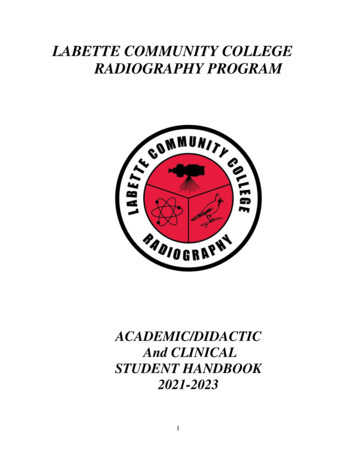
Transcription
LABETTE COMMUNITY COLLEGERADIOGRAPHY PROGRAMACADEMIC/DIDACTICAnd CLINICALSTUDENT HANDBOOK2021-20231
STUDENT ACADEMIC/DIDACTIC andCLINICAL HANDBOOKRADIOGRAPHY PROGRAMALLIED HEALTH DEPARTMENTLABETTE COMMUNITY COLLEGEPARSONS, KANSASThe Policies and Procedures in this handbook have been endorsed by the Radiography ProgramAdvisory Committee to ensure the professional Conduct of all students.2021 - 20232
Table of ContentsTable of Contents . 3INTRODUCTION TO STUDENT HANDBOOK. 6ACADEMIC/DIDACTIC POLICIES AND REGULATIONS SECTION. 7MISSION STATEMENT. 8CONDITIONS OF ACCEPTANCE. 8ESSENTIAL TECHNICAL STANDARDS FUNCTIONAL ABILITIES POLICY. 11ACADEMIC MISCONDUCT POLICY. 12Academic / Didactic Methods of Evaluation . 16CLASSROOM ATTENDANCE POLICY. 17RADIOGRAPHY COMPUTER USAGE POLICY. 17EXTRACURRICULAR ACTIVITY ATTENDANCE POLICY. 18PROGRAM PROBATION POLICY. 18PROGRAM DISMISSAL POLICY. 19APPLYING FOR READMISSION INTO THE PROGRAM POLICY. 19TRANSFER STUDENT POLICY. 20EARLY STUDENT RELEASE POLICY. 21FINANCIAL COMMITMENTS POLICY. 21ENROLLMENT POLICY. 21CLINICAL POLICIES AND REGULATIONS SECTION. 22INTRODUCTION TO CLINICAL POLICIES AND REGULATIONS. 22CODE OF ETHICS. 23PROFESSIONAL CONDUCT. 24LCC - CLINICAL COORDINATOR RESPONSIBILITIES. 25CLINICAL EDUCATION SETTING RESPONSIBILITIES AND STUDENT ORIENTATION. 25STUDENT PLACEMENT AT CLINICAL EDUCATION SITE POLICY. 26UNIFORM POLICY. 28RADIOGRAPHIC MARKERS POLICY. 28PERSONAL HYGIENE POLICY. 29CLINICAL SITE ATTENDANCE POLICY. 30EXCESSIVE ABSENTEEISM AND TARDINESS POLICY . 31MAKE UP TIME POLICY. 32EXCESSIVE ABSENTEEISM AND TARDINESS POLICY. 34DISASTER AND CONTINGENCIES POLICY. 35INCLEMENT WEATHER POLICY. 35ATTENDANCE CLINICAL PROBATION POLICY. 36GENERAL CLINICAL SITE POLICIES. 37PARKING POLICY. 37SMOKING/TOBACCO/GUM POLICY. 37CELL PHONE AND PERSONAL PHONE CALLS POLICY. 37LIABILITY INSURANCE POLICY. 38HEALTH INSURANCE AND RESPONSIBILITY FOR ILLNESS OR INJURY POLICY. 38HEALTH AND IMMUNIZATION POLICY. 38COMMUNICABLE DISEASE POLICY. 41INJECTION OF CONTRAST MEDIA POLICY. 42NEEDLE STICKS POLICY. 423
. 43. 47NONDISCRIMINATION - POLICY 2.01. 48STUDENT DAILY EXAMINATION LOG AND ATTENDANCE RECORD POLICY. 48TRAJECSYS USAGE POLICY. 49CLINICAL LAPTOP COMPUTER USAGE POLICY. 50CONFIDENTIALITY POLICY. 51FALSIFICATION OF RECORDS POLICY. 51CLINICAL ROTATION SCHEDULE POLICY. 52VASCULAR (CATH LAB) ROTATION POLICY. 53MAMMOGRAPHY CLINICAL ROTATION POLICY. 53MAGNETIC RESONANCE SAFETY POLICY. 54CLINICAL SUPERVISION POLICY. 54ROTATIONS OTHER THAN NORMAL DAYTIME HOURS POLICY. 56REPEAT IMAGE POLICY. 56CLINICAL BASED COMPETENCY POLICY. 57CLINICAL EVALUATION POLICY. 57UNAUTHORIZED REMOVAL OF HOSPITAL PROPERTY POLICY. 58DISCIPLINARY ACTION POLICY. 58DISCIPLINARY ACTION FOR CLINICAL EDUCATION SITE POLICY. 59PROGRAM RECOMMENDATIONS REGARDING HIRING OF STUDENTS. 59STUDENT GRIEVANCE/APPEAL POLICY. 59RADIATION MONITORING DEVICE POLICY. 60RADIATION PROTECTION POLICY. 61STUDENT PREGNANCY POLICY. 62CRIMINAL BACKGROUND CHECK POLICY. 64COMPETENCY BASED CLINICAL EDUCATION SECTION. 67INTRODUCTION TO CLINICAL EDUCATION. 67CLINICAL REQUIREMENTS. 68DIDACTIC/CLINICAL INTEGRATION. 69COMPETENCY-BASED CLINICAL EDUCATION. 72EVALUATING COMPETENCY. 75COMPETENCY REQUIREMENTS. 75CRITERIA FOR PERFORMANCE EVALUATION. 77TERMINAL RADIOGRAPHY PROGRAM COMPETENCIES. 78CLINICAL COMPETENCY REQUIREMENTS. 79SIGNATURES RELATING TO POLICIES SECTION. 83AUTHORIZATION TO RELEASE PERFORMANCE INFORMATION . 83AUTHORIZATION TO RELEASE HEALTH RECORDS AND INSURANCE INFORMATION . 83LCC DRUG SCREENING POLICY and PROCEDURE 4.16. 85STATEMENT OF RESPONSIBILITY. 86CONFIDENTIALITY STATEMENT. 86MAKE UP TIME POLICY. 86MAGNETIC RESONANCE SAFETY POLICY. 86CLINICAL ROTATION SCHEDULE POLICY. 87RADIOGRAPHY STUDENT COMPUTER USAGE STATEMENT. 87REMEDIATION COUNSELING AND TUTORING STATEMENT. 87LCC DRUG TESTING FOR HEALTH SCIENCE & WORKFORCE EDUCATION ALLIED HEALTH STUDENTS - POLICY 4.16SEXUAL HARASSMENT POLICY4
. 88. 89STANDARDS FOR AN ACCREDITED EDUCATIONAL PROGRAM IN RADIOLOGICSCIENCES SECTION . 100The self-study report, as well as the results of the on-site evaluation conducted by the site visit team, willdetermine the program’s compliance with the Standards by the JRCERT Board of Directors. . 101Standard One: Accountability, Fair Practices, and Public Information. 103The sponsoring institution and program promote accountability and fair practices in relation to students, faculty,and the public. Policies and procedures of the sponsoring institution and program must support the rights ofstudents and faculty, be well-defined, written, and readily available. . 103Objectives: . 103Standard Two: Institutional Commitment and Resources . 104The sponsoring institution demonstrates a sound financial commitment to the program by assuring sufficientacademic, fiscal, personnel, and physical resources to achieve the program’s mission. . 104Objectives: . 104Standard Three: Faculty and Staff . 105The sponsoring institution provides the program adequate and qualified faculty that enable the program to meet itsmission and promote student learning. . 105Objectives: . 105Standard Four: Curriculum and Academic Practices . 106Standard Five: Health and Safety . 107The sponsoring institution and program have policies and procedures that promote the health, safety, and optimaluse of radiation for students, patients, and the public. . 107Objectives: . 107Standard Six: Programmatic Effectiveness and Assessment: Using Data for Sustained Improvement . 108The extent of a program’s effectiveness is linked to the ability to meet its mission, goals, and studentlearningoutcomes. A systematic, ongoing assessment process provides credible evidence that enables analysis and criticaldiscussions to foster ongoing program improvement. . 108Objectives: . 108Glossary of Terms . 109Awarding, Maintaining, and Administering Accreditation . 112STUDENT ACADEMIC/DIDACTIC And CLINICAL HANDBOOKRADIOGRAPHY PROGRAM EXIT INTERVIEW FORMA.Program/Sponsoring Institution Responsibilities 112B. JRCERT Responsibilities . 1135
INTRODUCTION TO STUDENT HANDBOOKThis Handbook has been developed to familiarize the learner with the various aspects of theRadiography Program. It outlines, describes, and presents the policies, procedures, outcomes,competencies and evaluations used throughout the program.The handbook is divided into sections as follows:Program Academic/Didactic Policies and RegulationsDescribes the Program’s mission and goals, the conditions of acceptance, technical standards,policies and procedures.Clinical Policies and RegulationsDescribes the conduct, appearance, vacations, personal leave, disciplinary actions, and otherpertinent policies to be followed in the clinical setting.Competency-Based Clinical EducationOutlines the procedures used to evaluate the learner's competency in various radiographicprocedures. Evaluation of the learner's competency is based on professional standards.Signatures Relating to PoliciesExplains authorization to release records, permission to post grades, drug screening, pregnancypolicy, drug screening policy and procedure, statement of responsibility, confidentialitystatement, remediation counseling, tutoring statement and Handbook policies.Standards for an Accredited Educational Program in Radiologic SciencesExpresses standards in outcomes and focuses on programmatic and student-related outcomes thatmeasure the total academic effort.Learners are encouraged to become familiar with this Handbook. The Handbook is extremelyimportant in assisting them to better understand the policies, procedures, and competenciesrequired to be successful in this Program.6
ACADEMIC/DIDACTIC POLICIES AND REGULATIONS SECTIONThe Policies and Procedures in this handbook have been endorsed by the RadiographyProgram Advisory Committee to ensure the professional conduct of all students7
MISSION STATEMENTThe Radiography Program at Labette Community College is committed to providing maximumopportunities at each level of achievement, encouraging the development of problem solving anddecision making skills, promoting effective communication skills, and employing competenttechnical practices that will support the highest level of ethical patient care. Additionally,Labette Community College is committed to supporting professional growth, lifelong learning,and graduating entry-level radiologic technologists.GOAL 1Students will be clinically competent.GOAL 2Students will communicate effectively.GOAL 3Students will use critical thinking and problem solving skills.GOAL 4Students will evaluate the importance of professional growth anddevelopment.GOAL 5The program will graduate entry-level radiologic technologists.Reviewed 9/2018CONDITIONS OF ACCEPTANCEStudents accepted into the Radiography Program must abide by the following terms:1. The student must submit to a criminal background check from the state or states in whichthey have resided over the past seven years.2. The student must provide documentation of all required immunizations prior to starting clinicaltraining. The student will not be allowed to begin clinical assignments unless documentationis on file in the Health Science office and any absence(s) occurred during this timeframe willbe subject to the conditions of the Program’s Attendance Policy. Upon initial entry if astudent does not have a current TB test result, they will be required to obtain a 2-Step TBtests and they must maintain a current annual test results throughout the duration of theirclinical training in the radiography program.3. The student shall agree to keep confidential any information regarding Hospital patients, aswell as all confidential information of the Hospital. The student will agree, under penalty oflaw, not to reveal to any person or persons except authorized clinical staff and associatedpersonnel any specific information regarding any patient and further agree not to reveal to8
any third party any confidential information of the Hospital, except as required by law or asauthorized by the Hospital.4. Some of our clinical sites require proof of health insurance; therefore, students are required toshow proof of health insurance upon entering the program. The student shall be responsiblefor any reasonable and customary costs of medical care for hospitalization resulting fromillness or injury arising out of or due to the student’s education, clinical experiences ortraining at each hospital.5. Students should be willing to dedicate most of their time to the didactic and clinical portionsof the radiography program throughout the 23 months. This requires an educational, as wellas, financial commitment to the radiography program.6. Students must have access to a computer and the internet. This allows students access to thecollege’s web-based learning platform which the program utilizes for their course contentdelivery. In addition, the program and college business will be sent to the students’ LCCstudent email address and students are responsible for checking this account on a regularbasis.7. Students will rotate through at least two clinical education settings (student training sites)during the Program to assure that required "JRCERT Standard" competencies are achieved.8. A declared pregnant worker (student) implies that a pregnant student advises theRadiography Program and Clinical Education Setting voluntarily and in writing of herpregnancy and estimated date of conception. Formal, voluntary notification is the only meansby which the Program and Clinical Setting can ensure that the dose to the fetus can be limitedduring the pregnancy.9. Students applying for the Radiography Program are required to have a minimum GPA of2.50 for all prerequisite courses to satisfy the Radiography Program Associate in AppliedScience Degree and these prerequisite courses must be completed by the end of the springsemester prior to program admission in which a “C” or better grade has been earned.10. To be retained in the radiography program, students must maintain at least an overall gradepoint average of 2.0. All radiography courses must be a grade of "C" (90% - 86%) or better.If a student’s course grade falls below an 86% anytime during the semester, the student willseek remediation counseling or tutoring with their course instructor in efforts to identifystudy concerns or personal difficulties that might be interfering with student’s academicsuccess. The student and their instructor will develop an Action Plan in which the studentwill be encouraged to follow in attempt to increase their course grade to an 86% or higher inorder to pass the course.11. If the student fails a radiography course in a given semester, the student will be placed onprogram academic probation for the following semester. The student will be allowed to retakeall examinations (tests/evaluations) for the failed radiography course, as outlined in acontract established between the student and the instructor of the course. If a radiographystudent fails any of the retake examination(s) (tests/evaluations), the student will be dismissedfrom the program pending due process procedures. This policy will apply to both first and9
second year radiography students. Upon failure of a second course in any semester, theopportunity for retake examinations will not exist and the student will be dismissed from theprogram pending the due process procedures.12. Upon completion of final examinations each semester, each Radiography student will berequired to take a comprehensive multiple- choice examination covering content from ALLprevious semesters. The purpose of this examination is to promote retention of informationfrom one semester to the next. A maximum of two attempts will be allowed to obtain aminimum score of 86 percent. If a student fails on the first attempt, the student will seekremediation and retake the test. If the student fails on the second attempt he/she will bedismissed from the program pending the due process procedures.13. A student who is dismissed from the radiography program because of academic failure willbe allowed to reapply for the program. If the student is re-accepted and fails any radiographycourse within the two-year training period, the student will be dismissed from the programand will become ineligible to reapply. If a decision is made for dismissal the student andfaculty must complete the Exit Interview form.14. Clinical failure indicates clinical incompetence, therefore, to assure proper patient care andhealth care delivery, a student who fails any portion of their clinical training will be dismissedfrom the program, with no option to reapply and an “F” will be recorded for the course grade.15. The Clinical Education Setting has the right to request that the program director placestudents in a Clinical Education Setting other than the one that they were originally assigned,because of perceived or documented conflict.16. Failure to abide by Clinical Education Setting policies is also grounds for probation,suspension, or dismissal.17. Until a student achieves and documents competency in any given procedure, all clinicalassignments shall be carried out under the direct supervision of qualified radiographers. Theparameters of direct supervision are that a qualified radiographer reviews, evaluates, and ispresent during a radiographic examination.18. After demonstrating competency, students may perform procedures with indirectsupervision. (Indirect supervision is that supervision provided by a qualified radiographerimmediately available to assist students regardless of the level of a student's achievement.)19. In support of professional responsibility for the provision of quality patient care and radiationprotection, unsatisfactory radiographs must be repeated only in the presence of a qualifiedradiographer, regardless of the student's level of competency. If a student fails to abide bythis policy, the student will be dismissed from the program for not abiding by the direct andindirect supervision policy as deemed by the JRCERT Standard Four.20. The radiography student will conduct themselves in a professional manner, respond to patientneeds, and support colleagues and associates in providing quality patient care. (Code ofEthics, #1)21. Students may be put on probation, suspended, or dismissed from the radiography program10
for not abiding by the Radiography program's policies found in the Radiography StudentHandbook.22. If a student is unable to successfully complete the program in the specified time frame, due tounforeseen circumstances, the student can reapply and repeat portions of their training, whichwill result in the lengthening of their training beyond the stated graduation date.23. Due to the structure of the Program’s curriculum, a student will not graduate from theprogram until the 23 months have been completed.24. Successful completion of all program requirements and all comprehensive examinations willbe required before the A.R.R.T. Certificate of Completion from Labette CommunityCollege's Radiography Program may be granted.25. To complete the application for the American Registry of Radiologic TechnologistsExamination, the question, "Have you ever been charged with or convicted in court of amisdemeanor or felony?" Yes or No must be asked and answered. Falsification ofinformation is grounds for dismissal from the program. (Note: Charges or convictions of,a plea of guilty to, or a plea of nolo contendere to an offense constitutes a conviction forA.R.R.T purposes.)If you answer "Yes," provide an explanation and officialdocumentation. If, at any time during your attendance in the Program, the answer changes to"Yes," it is your responsibility to inform the Program Director immediately.In compliance with the LCC Criminal Background Procedure 3.20, the Health ScienceProgram student must notify their program director immediately if any change in theircriminal history occurs at any point in time after a Health Science Program application iscompleted, or while enrolled in a Health Science Program. Failure of the student to notifythe Program Director of any change in their criminal history while in the program will resultin immediate dismissal from the program or course with no opportunity for readmission.Health Science Program students who are unable to complete the clinical component of theprogram due to a felony criminal conviction, a misdemeanor, a drug offense, or a plea of nocontest that occurred after being accepted into the program will be dismissed from theprogram after an opportunity for a hearing.26. The radiography program cannot guarantee placement into radiologic technology positionsin the four-state region.Rev. 9/2020ESSENTIAL TECHNICAL STANDARDS FUNCTIONAL ABILITIES POLICYLabette Community College subscribes to all principles and requirements of the Americanwith Disabilities Act of 1990 for qualified handicapped individuals. These functional abilitiesare skills required of students in the clinical facilities used in the Radiography Program.Applicants are encouraged to self-identify their accommodation needs as part of the11
application process. After admission, if the student requires accommodations for a disability,then the student’s health care provider will need to verify in writing that the student has thefollowing functional abilities necessary for successful completion of the Radiographyprogram and employment: Critical thinking ability sufficient for clinical judgment; including sufficient int
of the radiography program throughout the 23 months. This requires an educational, as well as, financial commitment to the radiography program. 6. Students must have access to a computer and the internet. This allows students access to the college's web-based learning platform which the program utilizes for their course content delivery.
